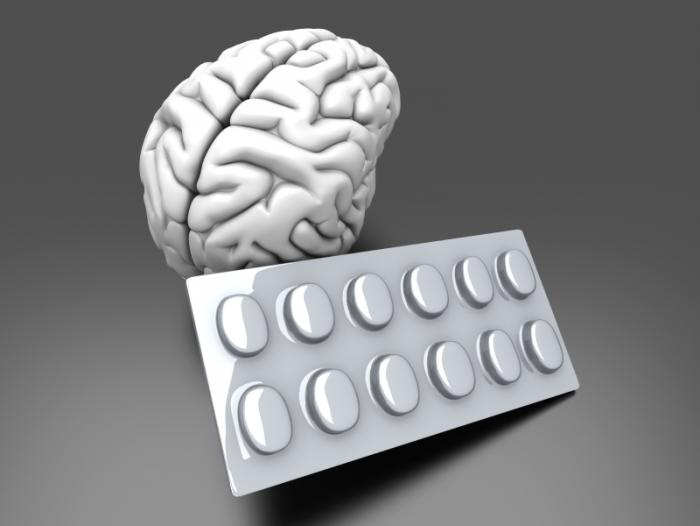In this article, we will go over what antipsychotics are, how they work, and what the risks and benefits of taking them are. We will also discuss some common side effects as well as experts’ opinions about using antipsychotics to treat mental illnesses.
Contents
- 1 Understanding Antipsychotics
- 2 Administering Antipsychotics
- 2.1 Availability of Antipsychotics
- 2.2 Dosage And Administration
- 2.3 If I Miss A Dose Of Antipsychotics
- 2.4 Things I Should Avoid While Taking Antipsychotics
- 2.5 If I Overdose On Antipsychotics
- 2.6 Time It Takes For Antipsychotics To Work
- 2.7 Most Important Thing That I should Know About Antipsychotics
- 2.8 Things I Should Discuss With My Doctor Before Taking Antipsychotics
- 3 Evaluating Antipsychotics
- 4 Experts’ Opinion About Antipsychotics
- 5 Conclusion
- 6 A Word From Therapy Mantra
Understanding Antipsychotics
Antipsychotics are a class of drugs prescribed to treat mental illnesses such as schizophrenia, bipolar disorder, and major depressive disorder. They work by changing the chemical levels in the brain. There are many different types of antipsychotics, each with its own set of possible side effects. Before taking antipsychotics, it is important to discuss all the risks and benefits with your doctor.
Types of Antipsychotics
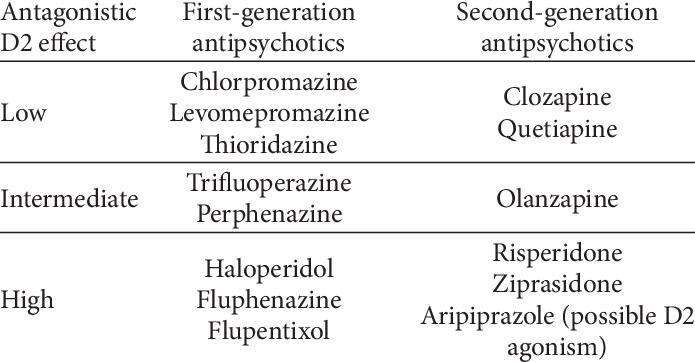
There are many different types of antipsychotics, but they can be generally divided into two categories: typical and atypical.
Typical Antipsychotics: Typical antipsychotics are the older type of antipsychotic and work by blocking dopamine receptors in the brain. They tend to cause more serious side effects than atypical antipsychotics and are not as effective at treating symptoms of schizophrenia.
Examples of Typical Antipsychotics
- Chlorpromazine
- Haloperidol
- Trifluoperazine
Atypical Antipsychotics: Atypical antipsychotics are newer medications that work by blocking serotonin and dopamine receptors. They tend to cause fewer side effects than typical antipsychotics and are more effective at treating symptoms of schizophrenia.
Examples of Atypical Antipsychotics
Mechanism of Action
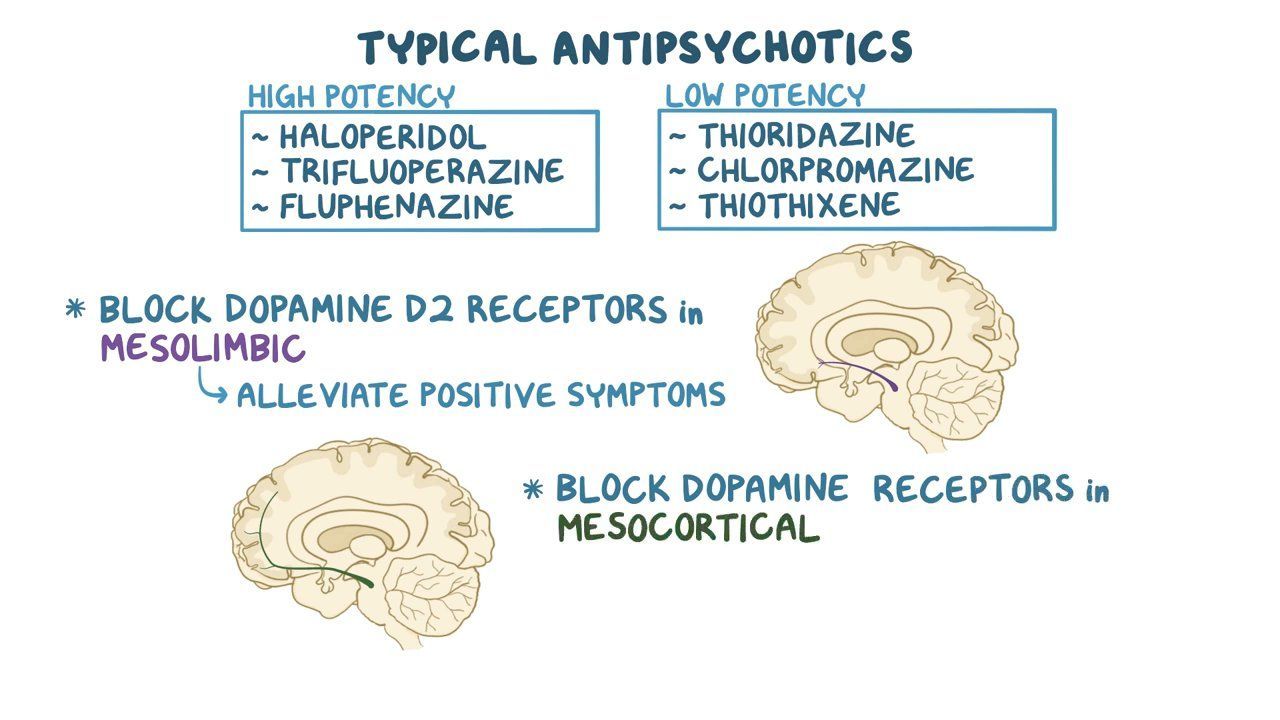
Antipsychotics work by changing the chemical levels in the brain. This can help improve symptoms of mental illnesses like schizophrenia, bipolar disorder, and major depressive disorder.
How Do Antipsychotics Work?
Antipsychotics work by blocking receptors for neurotransmitters such as dopamine and serotonin. They do this by binding to the receptor site on a neuron (nerve cell) instead of allowing other chemicals like these neurotransmitters to bind there. This causes changes in how that particular nerve cell functions because it no longer has access to certain chemicals that it needs to send signals.
NOTE: Dopamine and serotonin are involved in mood regulation and thought processes.
Administering Antipsychotics
Antipsychotic medications are available as tablets, capsules, liquids, and injections. The type of antipsychotic you take will depend on your situation and what is most appropriate for you.
Tablets: Tablets are the most common form of antipsychotic medication. They can be taken with or without food and are generally easier to swallow than capsules or liquids.
Capsules: Capsules are a solid form of antipsychotic medication that contains a powder inside them. These types of medications typically do not have an unpleasant taste, so they may be better for people who don’t like to swallow pills.
Liquids: Liquids are a type of antipsychotic medication that can be given by mouth or through a feeding tube. They usually have an unpleasant taste, so they may not be the best choice for people who don’t like to take pills.
Injections: Injections are a way to give an antipsychotic medication directly into the bloodstream. They are usually given through a needle or catheter inserted into your skin, muscle, artery, or vein.
Availability of Antipsychotics
There are two ways that antipsychotics are available: through a prescription from a doctor and over-the-counter.
Prescription Antipsychotics: Prescription antipsychotics are only available through a prescription from a doctor. They are covered by most insurance plans and tend to be less expensive than over-the-counter antipsychotics.
Examples of Prescription Antipsychotics
- Aripiprazole
- Clozapine
Over-the-Counter Antipsychotics: Over-the-counter antipsychotics are available without a prescription and may be covered by some insurance plans. They tend to cost more than prescription medications, but they do not require a doctor’s visit or insurance coverage to purchase them.
Examples of Over-the-Counter Antipsychotics
- Benztropine
- Chlorpromazine
- Diphenhydramine
Dosage And Administration
Dosage: The dosage of antipsychotics is based on age, weight, and other factors. It is important to follow your doctor’s instructions when taking these medications so that you do not have any problems with them or get sick from using too much of them at once.
Administration: Antipsychotic medication can be taken orally (by mouth), injected into a vein (intravenously), or injected under the skin (subcutaneously). It is important to follow your doctor’s instructions when taking these medications so that you do not have any problems with them or get sick from using too much of them at once.
If I Miss A Dose Of Antipsychotics
Take it as soon as you remember. If it is close to the time for your next dose, skip the missed dose and continue with your regular schedule. Do not take two doses at once.
Things I Should Avoid While Taking Antipsychotics
There are many things that you should avoid while taking antipsychotics. Some of these things include:
- Driving or operating machinery until you know how the medication affects your ability to perform these tasks
- Drinking alcohol, because can increase the risk of side effects such as drowsiness and dizziness
- Smoking cigarettes or using other tobacco products, which may decrease the effectiveness of the medication
If I Overdose On Antipsychotics
If you think that you may have overdosed on antipsychotic medication, contact poison control or go to the nearest emergency room. Bring the bottle of medication with you if possible. Symptoms of an overdose include:
- Drowsiness
- Dizziness
- Nausea and vomiting
- Low blood pressure (hypotension)
Time It Takes For Antipsychotics To Work
Antipsychotic medications typically take several weeks to start working. Your doctor may adjust your dose or prescribe other treatments while you are waiting for the medication to work.
NOTE: How long you will need to take antipsychotics depends on your situation.
Most Important Thing That I should Know About Antipsychotics
There are many important things that you should know about antipsychotic medications. Some of these include:
- They are not a cure for schizophrenia, but they can help control symptoms.
- It is important to take them as prescribed and do not stop taking them without talking to your doctor.
- They may cause side effects, some of which can be serious.
Things I Should Discuss With My Doctor Before Taking Antipsychotics
There are several things that you should discuss with your doctor before starting antipsychotic medications:
- Your overall health, including any other medical conditions you have
- The possible side effects of the medication and how to deal with them
- Whether there are any risks associated with taking the medication for a long time
- Whether there are any drug interactions that you should be aware of
Evaluating Antipsychotics
There are several factors to consider when choosing antipsychotic medication, including:
Effectiveness: Antipsychotic medications vary in how effective they are. It is important to discuss with your doctor which one is the best option for you.
Side Effects: Some antipsychotics cause more side effects than others do. Your doctor will help you decide which one will work best for you.
Price: Some antipsychotics are more expensive than others, and some have generic versions that cost less money but may not work as well. Your doctor can help you decide which one is the most affordable option for your situation.
Possible Side Effects Of Antipsychotics
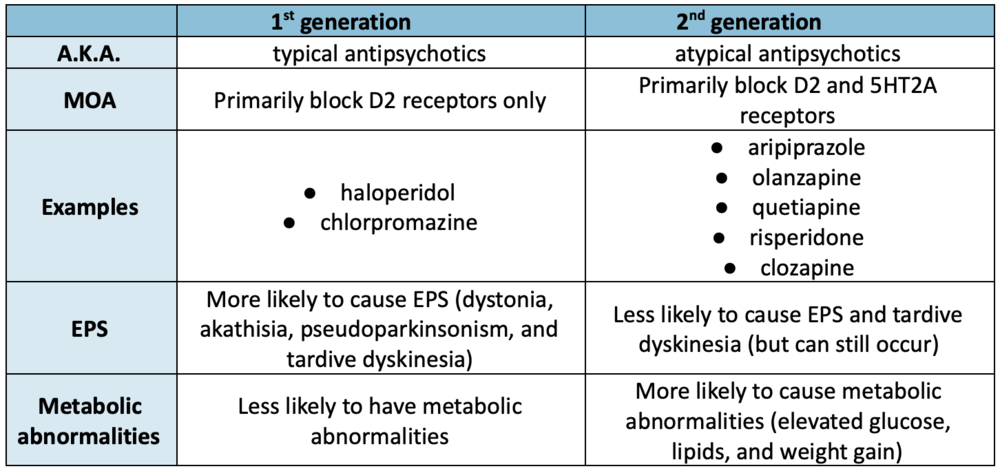
There are many possible side effects of antipsychotic medications, some of which are more common than others. The most common side effects include:
Common Side Effects Of Antipsychotics
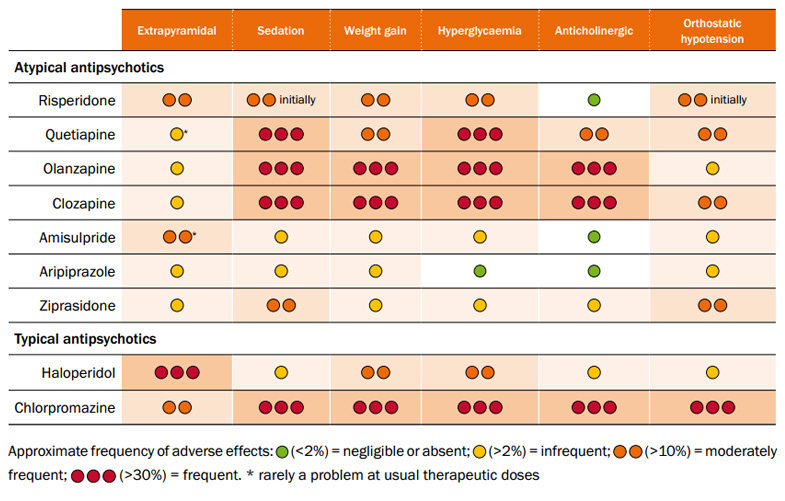
The common side effects of antipsychotic medications include:
Drowsiness and dizziness: These symptoms can make it hard to concentrate on tasks like driving or operating machinery. They may also cause fainting spells in some people.
Nausea and vomiting: Some people taking antipsychotics experience nausea and vomiting. This can often be controlled with medication or by taking the medication with food.
Low blood pressure (hypotension): Antipsychotic medications can cause a sudden drop in blood pressure, which may make you feel lightheaded or dizzy.
Weight gain: Many antipsychotic medications cause weight gain. Your doctor will monitor your weight to make sure it is not causing any health problems for you.
Movement problems (extrapyramidal symptoms or EPS) such as tremors, stiffness, and shaking: Some people taking antipsychotics have movement problems that can be quite severe in some cases.
Sexual problems such as erectile dysfunction or delayed ejaculation: Some people taking antipsychotics experience sexual problems that can make it hard to get an erection or have an orgasm during intercourse. These symptoms usually go away after stopping the medication, but they may be permanent in some individuals. If you are experiencing these side effects and would like to stop taking the medication, talk to your doctor about options other than stopping abruptly.
Rare Side Effects Of Antipsychotics
Some people taking antipsychotic medications experience rare but serious side effects, including:
Tardive dyskinesia: This is a condition that causes uncontrollable movements of the face, tongue, mouth, and jaw. It can be permanent in some cases.
Neuroleptic malignant syndrome (NMS): This is a life-threatening brain and muscle disorder that can happen when you stop taking antipsychotic medications suddenly. If you experience any of the following symptoms, call your doctor right away:
- Fever and sweating (usually with a high fever)
- Muscle stiffness or shaking
- Irregular heartbeat
- Fast breathing rate
- Hallucinations or confusion
Possible Drug Interactions With Antipsychotics
Many medications can interact with antipsychotic medications, either increasing or decreasing the effectiveness of the medication. Some common drug interactions include:
Antidepressants: Antipsychotic medications can increase the effects of antidepressants, which may cause an increased risk for side effects such as drowsiness and weight gain.
Sedatives (including alcohol): Taking antipsychotics with sedatives can make you feel very sleepy or even have a seizure. It is important not to drink alcohol while taking antipsychotics.
Anti-seizure medications: Antipsychotic medications can increase the effects of anti-seizure medication, which may cause an increased risk for side effects such as drowsiness and weight gain.
Antibiotics: Antipsychotic medications can interfere with the effectiveness of antibiotics, making them less effective at treating infections.
Anticoagulants (including warfarin): Taking antipsychotic medications with anticoagulants can increase the risk of bleeding.
Risks of Using Antipsychotics For a Long Time
Although there are many benefits to taking antipsychotics, they do come with some risks for long-term use. These include:
Weight gain: Many antipsychotic medications cause weight gain. This can lead to obesity and other health problems, such as high blood pressure, type II diabetes, and heart disease.
Neuroleptic malignant syndrome (NMS): This is a life-threatening brain and muscle disorder that can happen when you stop taking antipsychotic medications suddenly. If you experience any of the following symptoms, call your doctor right away:
- Fever and sweating (usually with a high fever)
- Muscle stiffness or shaking
- Irregular heartbeat
- Fast breathing rate
- Hallucinations or confusion
Osteoporosis: Antipsychotic medications can cause bone loss over time, which can lead to osteoporosis, a condition that makes bones weak and more likely to break.
Withdrawal Symptoms Of Antipsychotics
If you have been taking antipsychotic medications for a long period, it is important to talk with your doctor before stopping them. Some common withdrawal symptoms include:
- Agitation
- Anxiety
- Insomnia (trouble sleeping)
- Dizziness or vertigo (feeling like the room is spinning)
- Nausea and vomiting
- Headache
- Rapid heart rate
Alternatives To Antipsychotics
If you are experiencing side effects from antipsychotic medications, or if you do not feel that they are working well for you, there may be other options available. Some people with mental illness find that:
Psychotherapy (talking therapy): This is a treatment in which a therapist helps you talk about your thoughts and feelings. It can be helpful if you are experiencing symptoms such as depression, anxiety, or hallucinations.
Group therapy: This is a type of psychotherapy that involves talking with other people who have similar challenges and experiences. It can be helpful if you are feeling isolated from others or need support for dealing with mental illness.
Exercise: Exercise has been found to improve mood and well-being in people with mental illness. It can be helpful to find an exercise routine that you enjoy and can stick with.
Mindfulness: Mindfulness is a type of meditation that involves focusing on the present moment. It can help you learn how to cope with difficult thoughts and feelings.
Alternatives To Antipsychotics In Medications
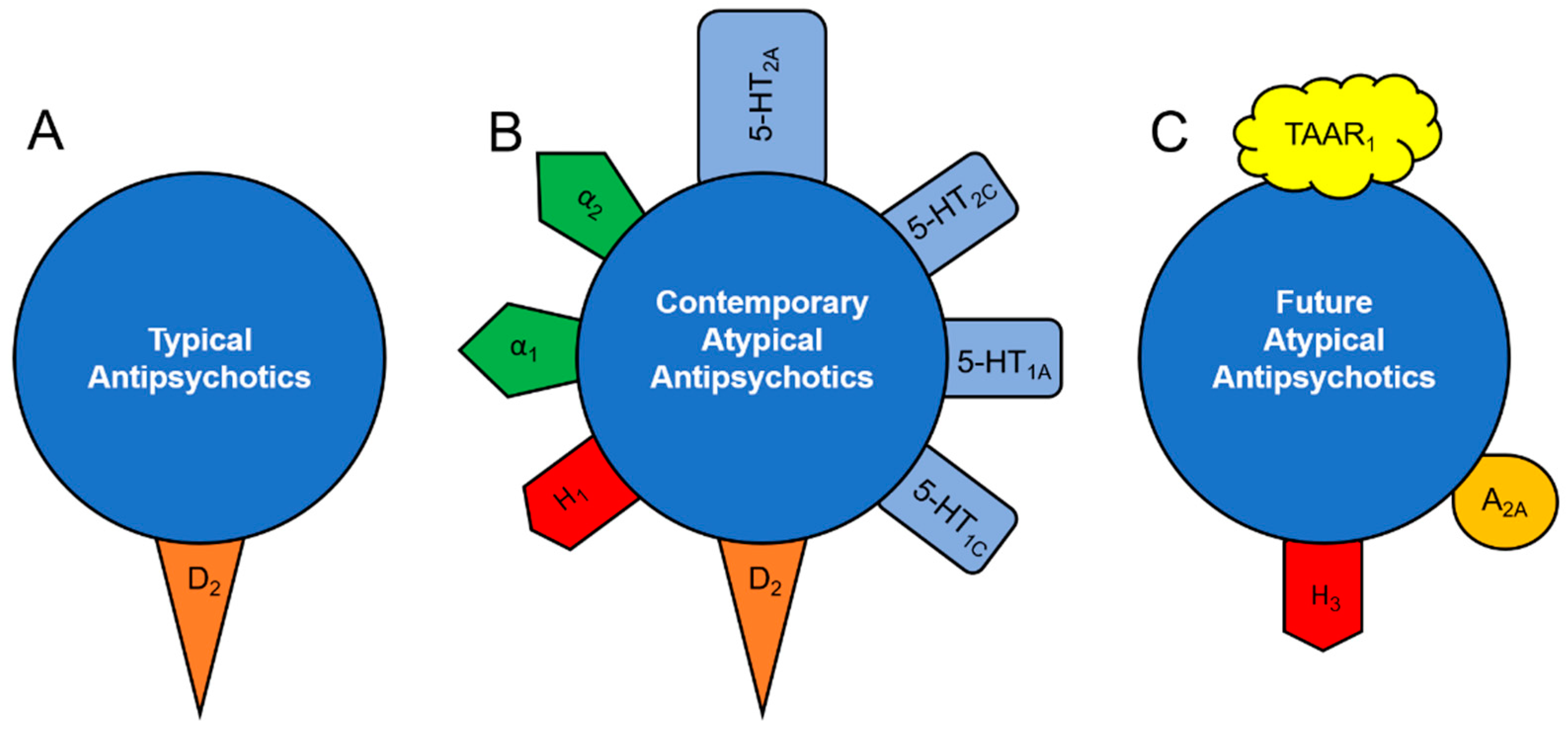
If you do not want to take antipsychotics, or if you are experiencing side effects from them, there may be other medications that can help. Some people with mental illness find that:
Mood stabilizers: These medications can treat symptoms of bipolar disorder such as mania and depression. They include Lithium carbonate (Lithobid), valproic acid (Depakote), and carbamazepine (Tegretol).
Antidepressants: Antidepressants can help treat symptoms of depression, anxiety, and other mental illnesses. They include fluoxetine (Prozac), sertraline (Zoloft), and paroxetine (Paxil).
Antianxiety medications: These can help treat symptoms of anxiety, such as nervousness, worry, and panic attacks. They include alprazolam (Xanax), lorazepam (Ativan), and clonazepam (Klonopin).
Experts’ Opinion About Antipsychotics
Andrew Solomon is a professor of clinical psychology at Columbia University and the author of The Noonday Demon: An Atlas Of Depression. He has written about mental health for many years, including pieces on bipolar disorder in The New Yorker and essays in his book Far From The Tree: Parents, Children And The Search For Identity (Scribner). In his book, he shares his experiences with depression and other mental illnesses that have affected him throughout his life.
He says: “Antipsychotics are not a cure for schizophrenia or any other psychotic disorder, but rather only treat the symptoms of those disorders.”
“They can be very effective at reducing hallucinations and delusions (false beliefs), but they can also have serious side effects, including weight gain, diabetes, and problems with the heart and liver.”
“For these reasons, antipsychotics should be used only when other treatments (such as psychotherapy or group therapy) have not been effective.”
Case Study
Antipsychotic Medication Use In A Patient With Schizophrenia
Jimmy is a 38-year-old man who was recently diagnosed with schizophrenia. His doctor prescribed him aripiprazole (Abilify), an antipsychotic medication.
Jimmy is feeling better since starting the medication and has not had any hallucinations or delusions. However, he is experiencing some side effects from the medication, including weight gain and drowsiness.
Jimmy’s doctor tells him that these side effects are common with antipsychotics and that they should go away after a while. He also tells Jimmy that the medication will help to control his schizophrenia symptoms.
Conclusion
Antipsychotics are a type of medication that can help treat symptoms of mental illness, such as hallucinations and delusions. However, they can also have serious side effects, including weight gain, diabetes, and problems with the heart and liver. For these reasons, antipsychotics should be used only when other treatments (such as psychotherapy or group therapy) have not been effective.
If you are experiencing side effects from antipsychotics, talk to your doctor about possible alternatives. There may be other medications that can help control your symptoms without causing such serious side effects.
A Word From Therapy Mantra
Your mental health — Your psychological, emotional, and social well-being — has an impact on every aspect of your life. Positive mental health essentially allows you to effectively deal with life’s everyday challenges.
At TherapyMantra, we have a team of therapists who provide affordable online therapy to assist you with issues such as depression, anxiety, stress, workplace Issues, addiction, relationship, OCD, LGBTQ, and PTSD. You can book a free therapy or download our free Android or iOS app.
